The Potato Diet: Benefits, Rules, Foods To Eat And Avoid
Join the diet craze where delicious spuds become your secret to weight loss.
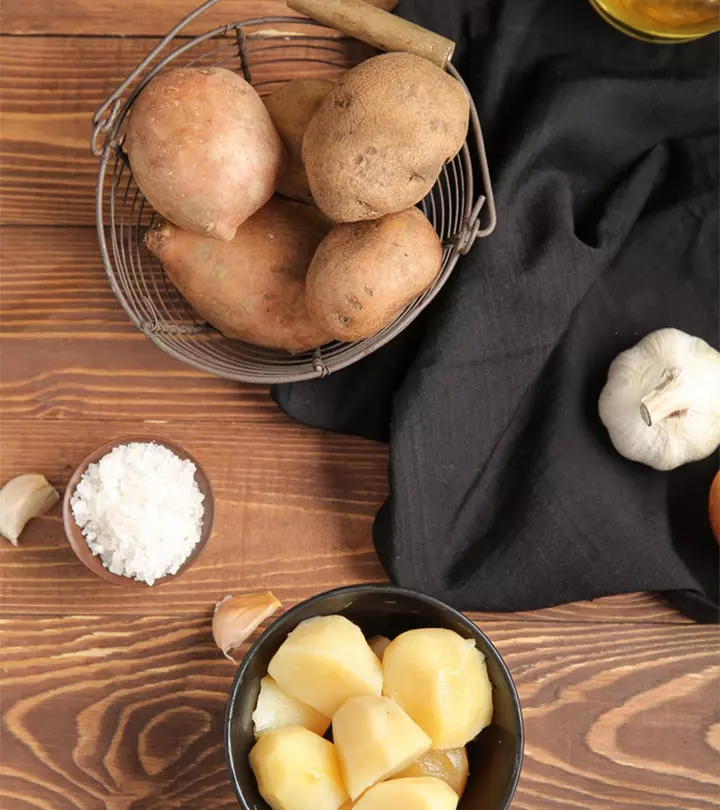
Image: Shutterstock
The potato diet is an easy short-term diet that claims to promote quick weight loss. Yes, this ‘spud’-tacular diet promises an easier path to calorie control. It emphasizes the intake of potatoes while eliminating all other foods for three to five days. This fad dieti A diet plan that claims to promote rapid weight loss or other health benefits, with no scientific backing and long-term sustainability. is also claimed to improve gut health and manage blood pressure levels. In this article, we have listed the types of potatoes to include in this diet, its benefits, associated risks, a sample diet plan, and recipes. Read on!
 At A Glance: Potato Diet
At A Glance: Potato Diet- Principle: Eating only potatoes (baked or boiled) for three to five days
- Purpose: For quick weight loss
- Who Is It For: People who are looking for a rapid weight loss solution
- Duration: Short-term
- Who Should Avoid: People with diabetes or (a history of) disordered eatingi Unhealthy eating patterns that do not meet the criteria for a diagnosed eating disorder. and pregnant and breastfeeding individuals
- Cons: May cause nutritional deficiencies and lead to disordered eating
In This Article
What Is The Potato Diet?
The potato benefits our health in a variety of ways, making it a staple in many diets. The potato diet is a short-term restrictive diet that is claimed to promote rapid weight loss. The idea of an all-potato diet was first introduced in 1849, but Tim Steele’s 2016 book ‘Potato Hack: Weight Loss Simplified’ revived it. Potatoes are the main source of calories in this diet. This popular fad diet is said to help you lose 0.45 kg weight by consuming potatoes while avoiding all other foods for three to five days. Though most people claim that this diet has helped them lose weight and strengthen their immune system, there is no scientific evidence to prove those claims.
 Did You Know?
Did You Know?Now that we have explored what exactly the potato diet means, let’s delve into the specific rules of this diet plan in the next section.
Key Takeaways
- The potato diet is a short-term, low-calorie diet that claims to offer rapid weight loss.
- This highly restrictive diet focuses only on eating potatoes for three to five days without using any seasonings, oils, or toppings.
- The lack of some essential nutrients may cause deficiencies, and this dietary approach may also lead to disordered eating.

Rules Of The Potato Diet
There are several variations in the potato diet. However, according to Tim Steele’s book, there are some potato diet rules you need to follow:
- Not all types of potatoes are allowed in the potato diet. Only white potatoes (russet potatoes) are allowed.
- Eat only plain, cooked potatoes for three to five days.
- Eat only 2-5 pounds of potatoes each day.
- The potatoes can be prepared in various ways, like baking, boiling, steaming, or mashing. Avoid frying.
- Avoid using high-calorie toppings such as butter, cheese, ketchup, or seasonings.
- Only drink water, plain tea, and black coffee without any additives.
- Salt is acceptable, but try to avoid it.
- Light exercises, like walking and cycling, are recommended.
- Avoid eating highly processed potato chips and French fries.
- You can continue your usual medications as prescribed by your doctor, but avoid using dietary supplements.
These are the specific guidelines that are associated with the potato diet. Let’s now discuss how this dietary plan helps with weight loss in the following section.
Potato Diet For Weight Loss
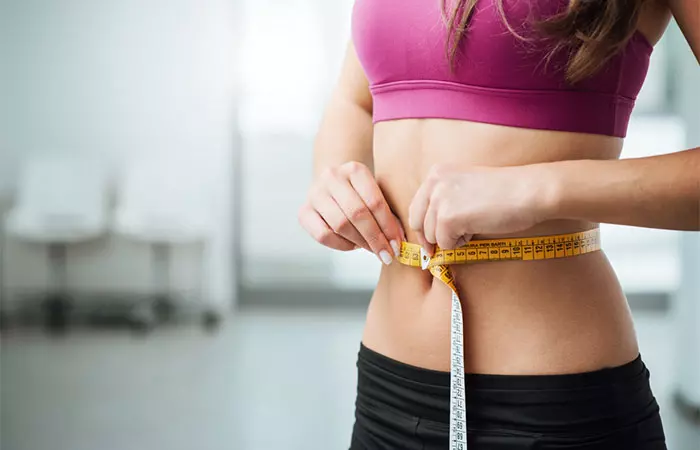
The potato diet is specifically designed for weight loss. While there is not enough studies done on the potato diet, research shows that diets that restrict calories may help you lose weight (1). One study published in the Endocrinology and Metabolism Clinics of North America journal found that lower fat and calorie intake was linked with weight loss (2). People who follow the potato diet only eat 2-5 pounds of potatoes per day, which is around 530-1300 calories. This is less than the average adult intake, which is generally around 2000 calories a day for women and 2500 calories for men (3).
Potatoes contain potato protease inhibitor IIi A naturally occurring enzyme found in potatoes that affects the digestion process by inhibiting the breakdown of proteins. , which may reduce your appetite and decrease hunger levels (4). In addition, following a very-low-calorie or low-fat diet may reduce body weight (5).
 Did You Know?
Did You Know?Now, let’s take a look at the other purported benefits of the potato diet.
Other Health Benefits Of The Potato Diet
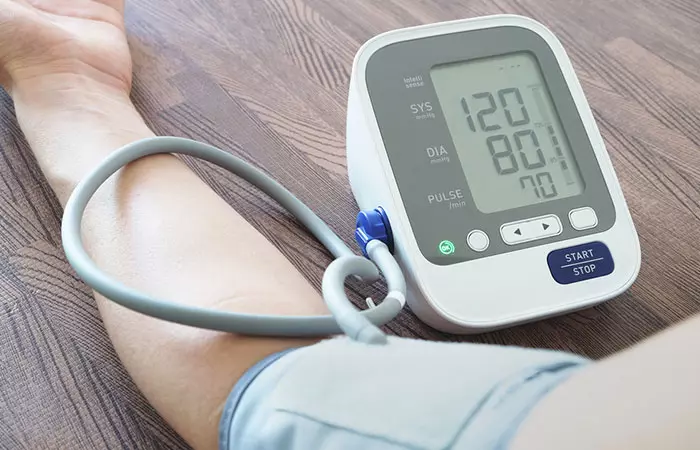
- May Improve Gut Health
Potatoes are high in dietary fiber that may support a healthy gut microbiome by providing probioticsi Live microbes that are believed to provide several health benefits if consumed in adequate quantities by improving your gut microbiota. to feed beneficial gut bacteria (6), (7).
- May Lower Blood Pressure
Potatoes are rich in potassium, which may help regulate blood pressure levels in hypertensive individuals (8).
But, it is important to note that there is not enough verifiable scientific data to prove that following the potato diet offers these benefits. The information listed above is based on research done on the health benefits of potatoes.
So what can you eat while following this diet? Scroll down to find out!
Foods To Eat On The Potato Diet
White potatoes (russet potatoes) are the only food you can eat on this diet. But you can prepare them in different ways:
- Raw potatoes
- Boiled potatoes
- Baked potatoes
- Steamed potatoes
- Mashed potatoes (without milk, butter, oil, cream, etc.)
- Oven-baked, oil-free French fries
- Oven-baked hash browns
You cannot include all types of potatoes and toppings in your diet. Let’s find out what to avoid in the potato diet in the next section.
Foods To Avoid On The Potato Diet
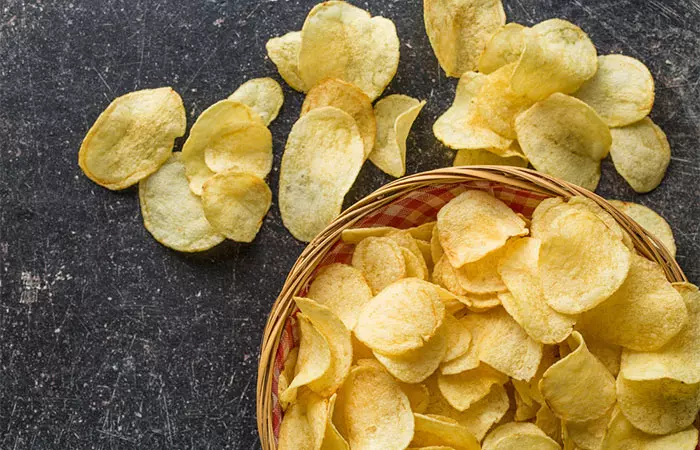
You cannot eat potato in all its types and forms on the potato diet. Here are some potato types and products to avoid:
- Sweet potatoes
- Yams
- Sauces and condiments
- Seasonings (except salt)
- Vegetable or meat toppings
- Fried potatoes (like French fries and potato chips)
If you want to get the most out of a potato diet, you need to follow it correctly. Scroll down to find out some effective tips for preparing for this diet.
Tips To Follow The Potato Diet
Here are some tips to consider if you want to try this diet:
- Opt for the right (white) potatoes to start your diet.
- Try different cooking techniques (like baking, steaming, or mashing) rather than always eating plain potatoes.
- Pay attention to your hunger signals and only eat until you are full and not stuffed. Do not eat just because it is mealtime.
- Getting enough calories is important for diet adherence, preventing fatigue or hunger, and maintaining energy levels.
- Monitor your portion sizes to control your calorie intake because overeating potatoes may lead to weight gain.
- Drink enough water throughout the day to stay hydrated and control your appetite.
- Monitor your progress and keep track of your energy levels and weight while you are on the potato diet.
Note:
If you experience any adverse effects, stop following this diet immediately and consider consulting a healthcare professional for further assistance.
Planning your meals according to your dietary requirements makes the entire process more effective. The following sample menu can give you an idea.
3-Day Potato Diet Meal Plan
Day 1
- Breakfast: 1 medium-sized boiled potato seasoned with a pinch of salt
- Lunch: 2 steamed potatoes
- Snack: 1 raw potato
- Dinner: Oven-baked, oil-free French fries
Day 2
- Breakfast: 2 baked hash browns with one cup of plain tea
- Lunch: 2 medium-sized boiled potatoes, served cold
- Snack: 1 small baked potato
- Dinner: 2 plain, baked potatoes
Day 3
- Breakfast: 2 boiled potatoes with one cup of black coffee
- Lunch: 2 medium-sized baked potatoes seasoned with a dash of salt
- Snack: 1 boiled potato
- Dinner: 2 medium-sized steamed potatoes
You can prepare potato recipes very easily at home. Scroll down to check out some recipes in the following section.
Potato Diet Recipes
1. Oven-Baked, Oil-Free French Fries
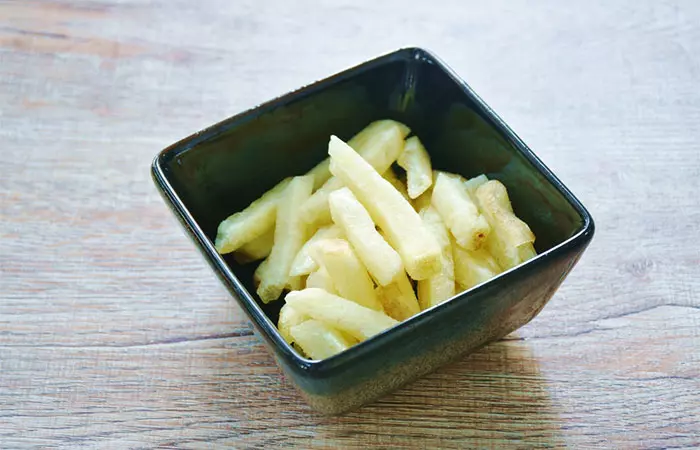
Ingredients
- 4-6 medium-sized russet potatoes
- Salt to taste
How To Prepare
- Preheat the oven to 450॰F and line a baking sheet pan with parchment paper.
- Slice potatoes into thin ½-¼ inch strips.
- Add them to a large bowl and soak them in ice water for 10 minutes
- Drain the water and pat the potato strips dry with a clean dish towel.
- Spread them on the sheet pan and sprinkle salt all over them.
- Bake for 15–20 minutes, flip, and bake until the potatoes turn golden and crispy.
2. Baked Hash Browns
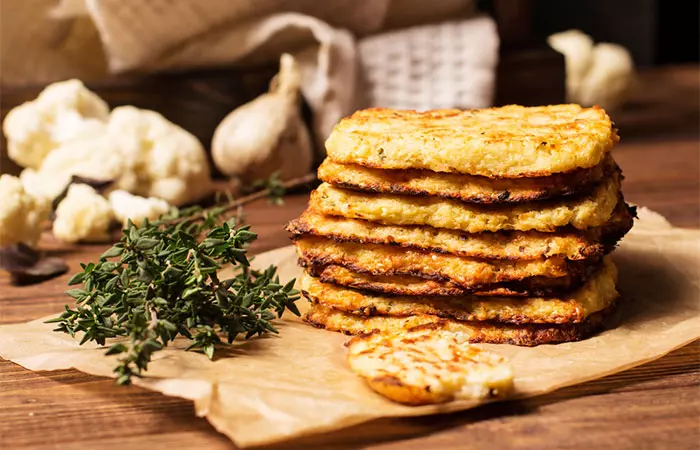
Ingredients
- 2 medium-sized russet potatoes
How To Prepare
- Peel and cut the potatoes using a spiral vegetable cutter or grate them with a large cheese grater.
- Pat the grated potatoes dry with paper towels to remove all moisture.
- Preheat a non-stick frying pan on medium heat.
- Spread the grated potatoes in a 1-inch layer on the heated pan.
- Cook for 5-7 minutes with the lid partially off, occasionally check for browning.
- Flip the hash browns and cook them with the lid partially on for an additional 5–7 minutes.
These are some simple potato diet recipes you can try. But are there any risks associated with the potato diet? Scroll down to know more.
Side Effects Of The Potato Diet
The biggest drawback of the potato diet is that it cuts out all foods except potatoes. This could lead to two major adverse effects:
- May Lead To Disordered Eating
The potato diet is extremely restrictive, and eating only potatoes for three to five days can be a difficult task. It may also lead to disordered eating and other unhealthy eating habits, like overeating (9), (10).
- May Lead To Nutritional Deficiencies
Though potatoes are rich in potassium, magnesium, and vitamin C, they are low in other nutrients like sodium, calcium, and iron (11). Eating only potatoes, in turn, may lead to nutrient deficiencies due to an imbalance in your diet.
So, why do some people choose to follow this novel diet while others steer clear of it? Find out in the next section.
Pros And Cons Of The Potato Diet
Pros
- Easy To Follow: The potato diet is straightforward and appealing to those who prefer a basic approach to weight loss.
- Affordable: The cost of this diet is not too high as potatoes are one of the most affordable foods.
- Short-Term Reset: Some people adopt this diet as a short-term reset to end their unhealthy eating habits or cravings for processed foods.
Cons
- Unsustainable: It can be monotonous and challenging to follow a diet consisting solely of potatoes for an extended period of time. In the long run, it can become unsustainable due to boredom and cravings for other food items.
- Short-Term Weight Loss: While some people may initially lose weight on a potato diet due to lower calorie consumption, this can be unsustainable over time and result in weight gain when switching back to a regular diet.
Infographic: What To Eat And Avoid On The Potato Diet
The potato diet is a highly restrictive weight loss diet in which potatoes are the only source of calories. But not all varieties of this root vegetable are included in this diet. We have rounded up the types of potato-based foods to include and avoid in this diet in the infographic below. Check it out!
Some thing wrong with infographic shortcode. please verify shortcode syntaxThe potato diet has gained attention for promoting rapid weight loss. People who are on this diet only can eat potatoes for 3-5 days. This diet plan is also claimed to improve gut health and lower blood pressure. But, there is no scientific evidence to prove these claims. It also lacks essential nutrients, is extremely restrictive in nature, and may cause unhealthy eating behaviors. Therefore, consult your healthcare professional before starting this fad diet.
Frequently Asked Questions
Is the potato diet suitable for athletes or active individuals?
The potato diet is unsuitable for athletes or active individuals due to the lack of adequate protein, essential nutrients, and calorie diversity required to support intense physical activity and recovery. Instead, the best way to maintain performance and overall health is to eat a balanced diet that includes complex carbohydrates, proteins, healthy fats, and a rich variety of fruits and vegetables.
Can I follow the potato diet if I have diabetes?
No. The intake of potatoes in any form, like boiled, baked, or mashed, is associated with insulin resistance and can elevate the risk of type 2 diabetes (12).
Can the potato diet be used as a detox or cleanse?
The potato diet does not provide all the necessary nutrients needed for optimal health. Also, there is no evidence that potatoes help in drawing out toxins.
Can I customize the potato diet to make it more balanced?
Yes. You can customize the potato diet to align with your nutritional goals with the help of a dietitian. In addition, pay attention to your portion sizes to manage your carb intake and monitor your blood glucose levels.
Illustration: The Potato Diet: Benefits, Rules, Foods To Eat And Avoid
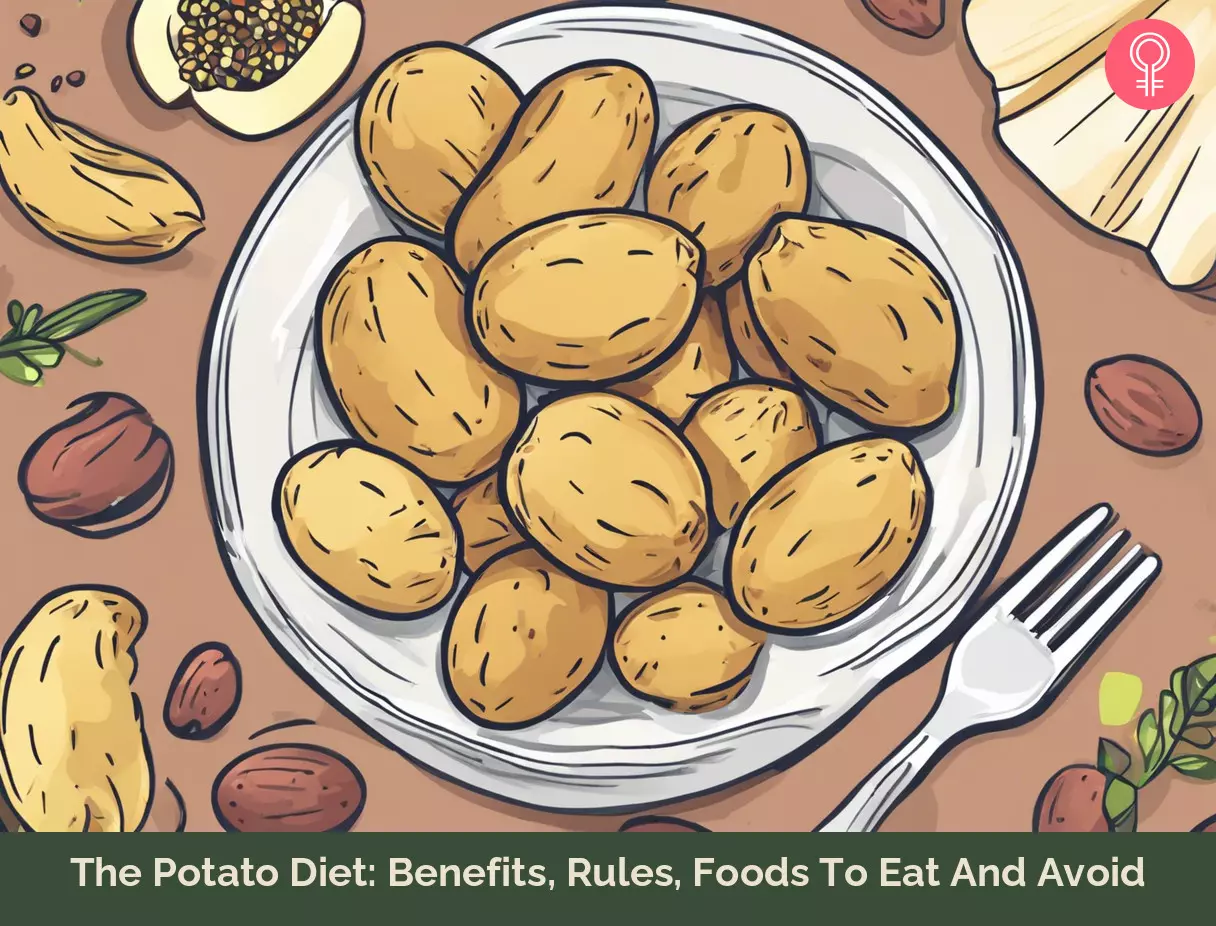
Image: Stable Diffusion/StyleCraze Design Team
Watch this captivating video by someone who actually followed the potato diet for five days to see what conclusions they came to.
References
Articles on StyleCraze are backed by verified information from peer-reviewed and academic research papers, reputed organizations, research institutions, and medical associations to ensure accuracy and relevance. Read our editorial policy to learn more.
- Comparison of weight loss among named diet programs in overweight and obese adults: a meta-analysis
https://pubmed.ncbi.nlm.nih.gov/25182101/ - The Role of Macronutrient Content in the Diet for Weight Management
https://www.sciencedirect.com/science/article/abs/pii/S0889852916300408?via%3Dihub - What should my daily intake of calories be?
https://www.nhs.uk/live-well/healthy-weight/managing-your-weight/understanding-calories/ - The Effect of Potato Protease Inhibitor II on Gastrointestinal Hormones and Satiety in Humans During Weight Reduction
https://www.ncbi.nlm.nih.gov/pmc/articles/PMC7049780/ - Effects of energy-restricted high-protein, low-fat compared with standard-protein, low-fat diets: a meta-analysis of randomized controlled trials
https://pubmed.ncbi.nlm.nih.gov/23097268/ - Potato Fibers Have Positive Effects on Subjective Appetite Sensations in Healthy Men, but Not on Fecal Fat Excretion: A Randomized Controlled Single-Blind Crossover Trial
https://www.ncbi.nlm.nih.gov/pmc/articles/PMC7697495/ - Fiber-Mediated Nourishment of Gut Microbiota Protects against Diet-Induced Obesity by Restoring IL-22-Mediated Colonic Health
https://pubmed.ncbi.nlm.nih.gov/29276170/ - Short-Term RCT of Increased Dietary Potassium from Potato or Potassium Gluconate: Effect on Blood Pressure, Microcirculation, and Potassium and Sodium Retention in Pre-Hypertensive-to-Hypertensive Adults
https://www.ncbi.nlm.nih.gov/pmc/articles/PMC8151047/ - Flexible vs. Rigid dieting strategies: relationship with adverse behavioral outcomes
https://pubmed.ncbi.nlm.nih.gov/10336790/ - Dietary restraint and weight loss as risk factors for eating pathology
https://www.sciencedirect.com/science/article/abs/pii/S147101531630229X?via%3Dihub - Potatoes, russet, without skin, raw
https://fdc.nal.usda.gov/fdc-app.html#/food-details/2346401/nutrients - Potato Consumption and Risk of Type 2 Diabetes: Results From Three Prospective Cohort Studies
https://www.ncbi.nlm.nih.gov/pmc/articles/PMC4764041/
Read full bio of Mary Sabat
Read full bio of Sindhu Koganti
Read full bio of Arshiya Syeda
Read full bio of Aparna Mallampalli






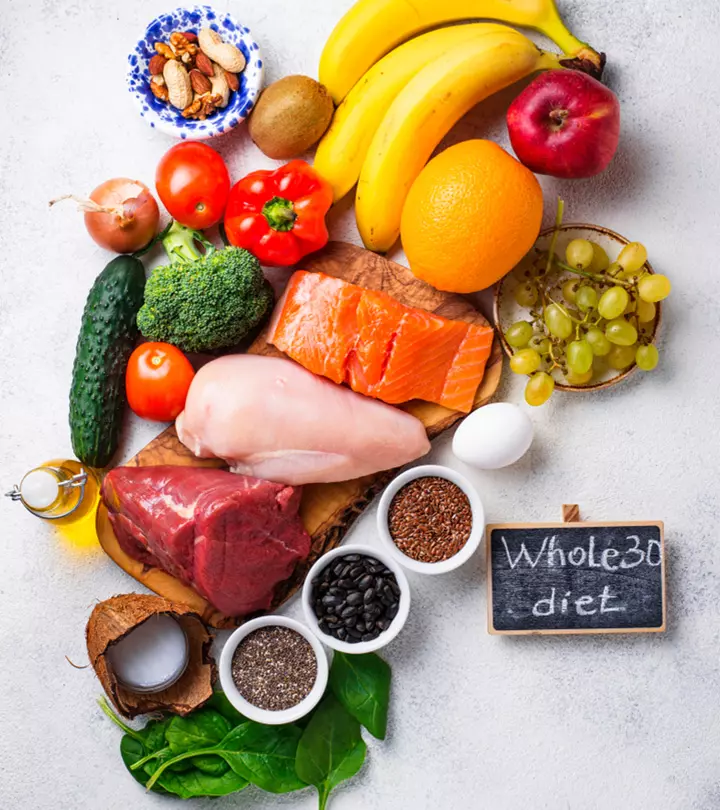
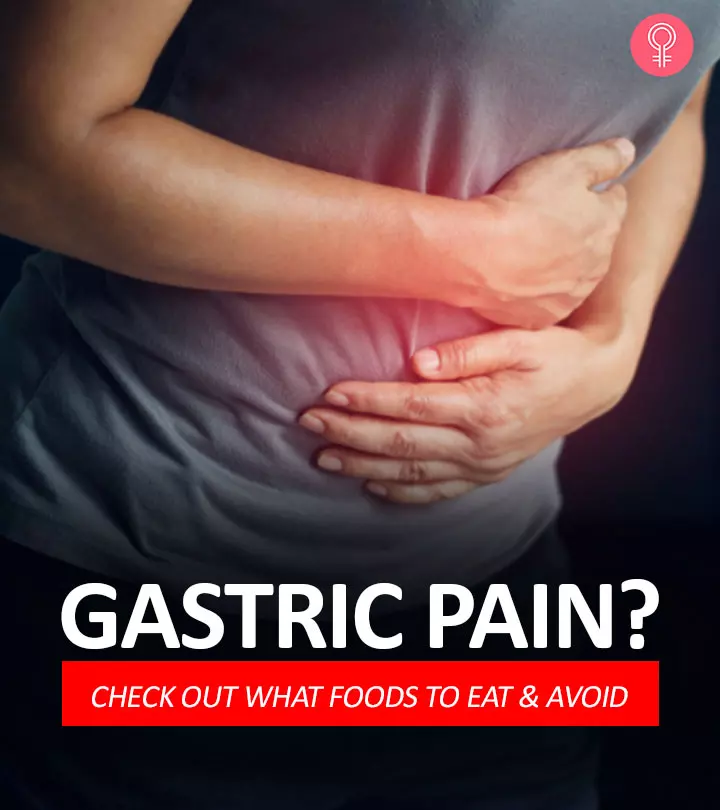
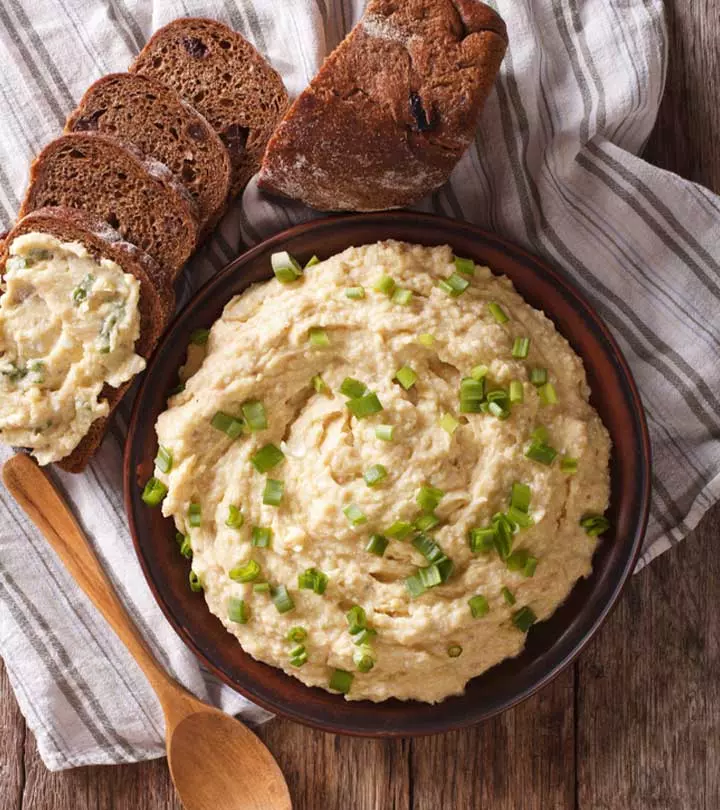

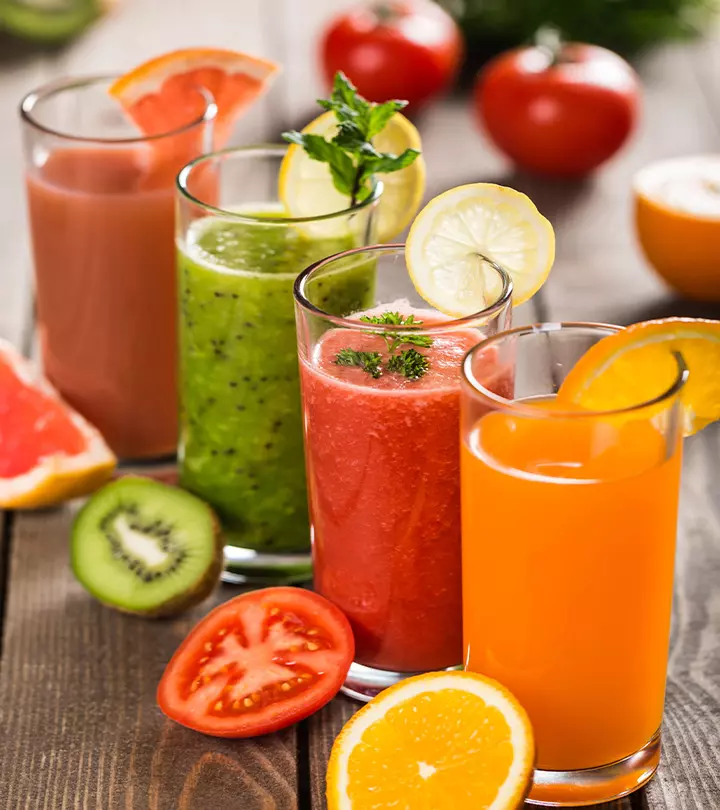
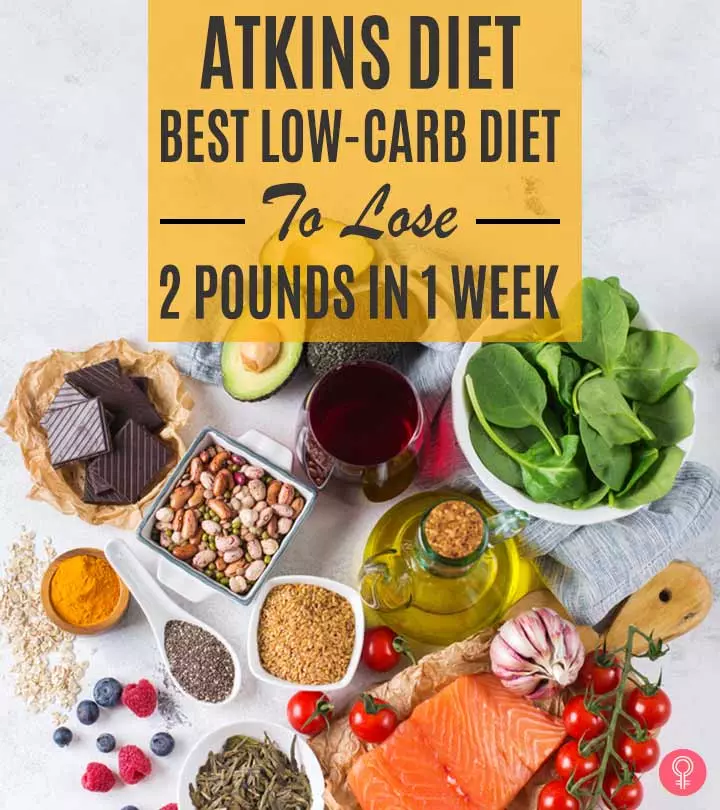

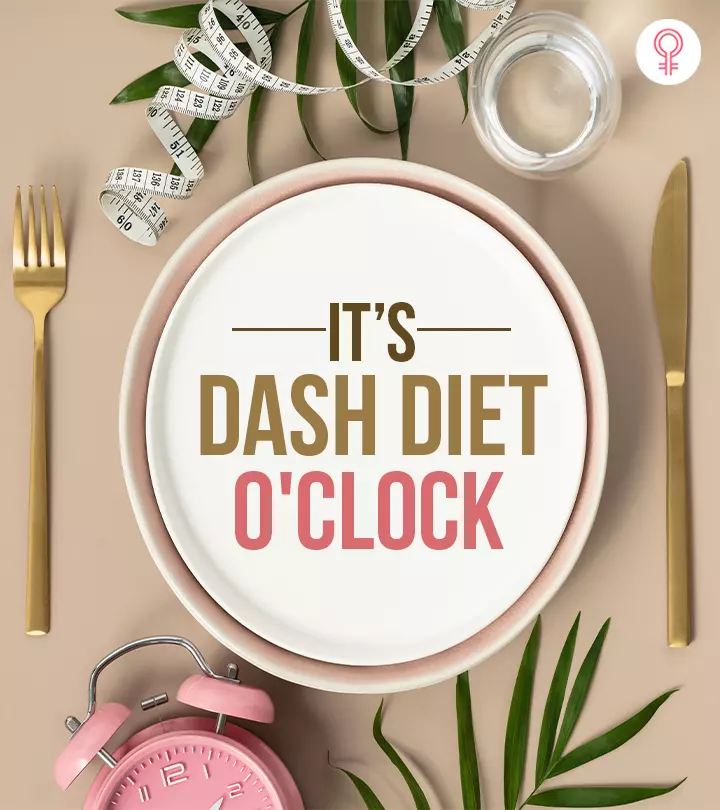



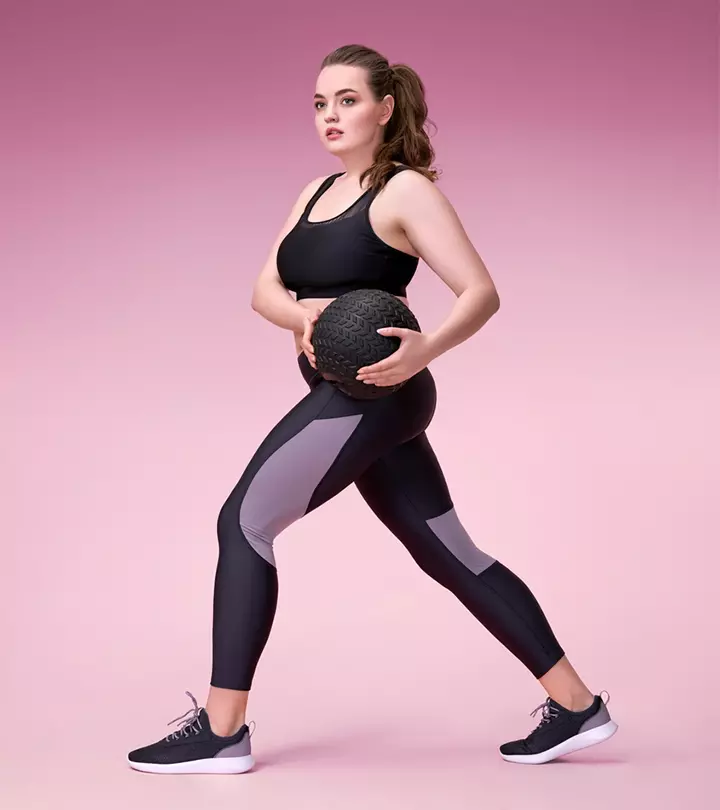
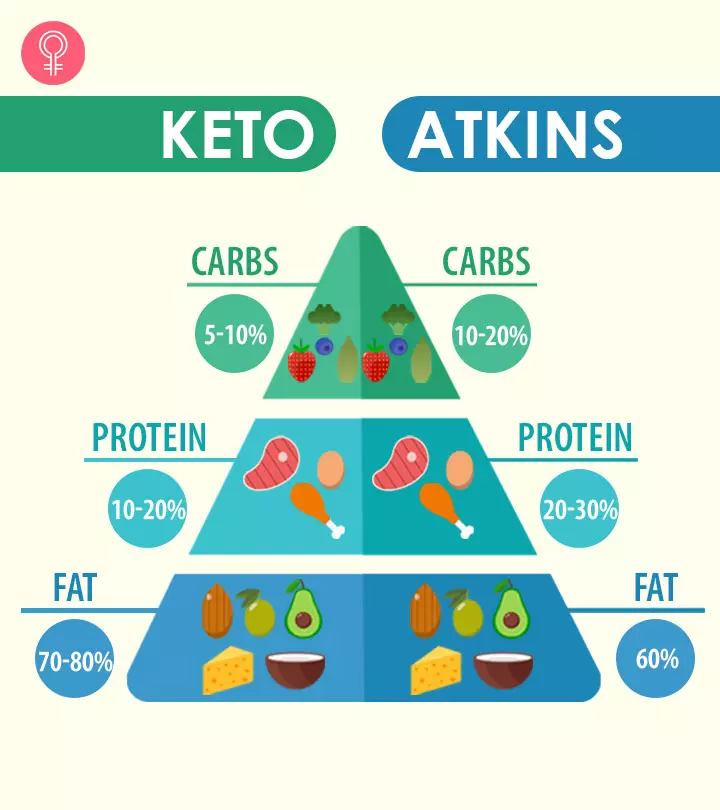

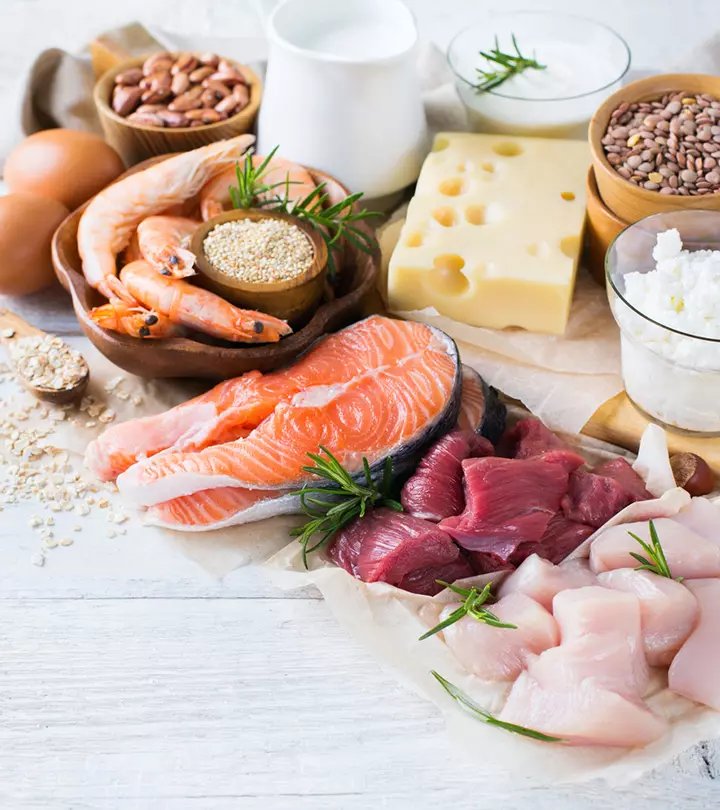
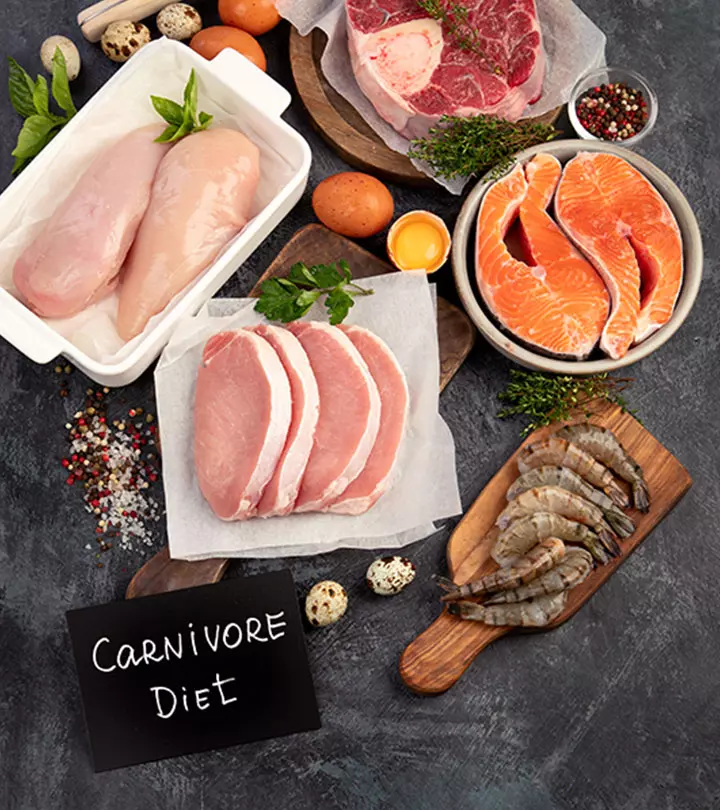
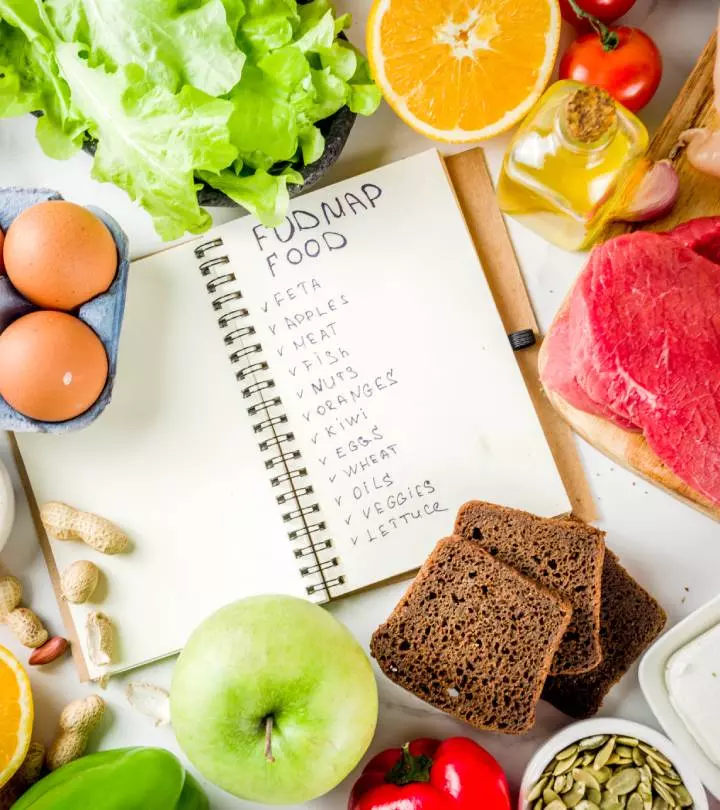
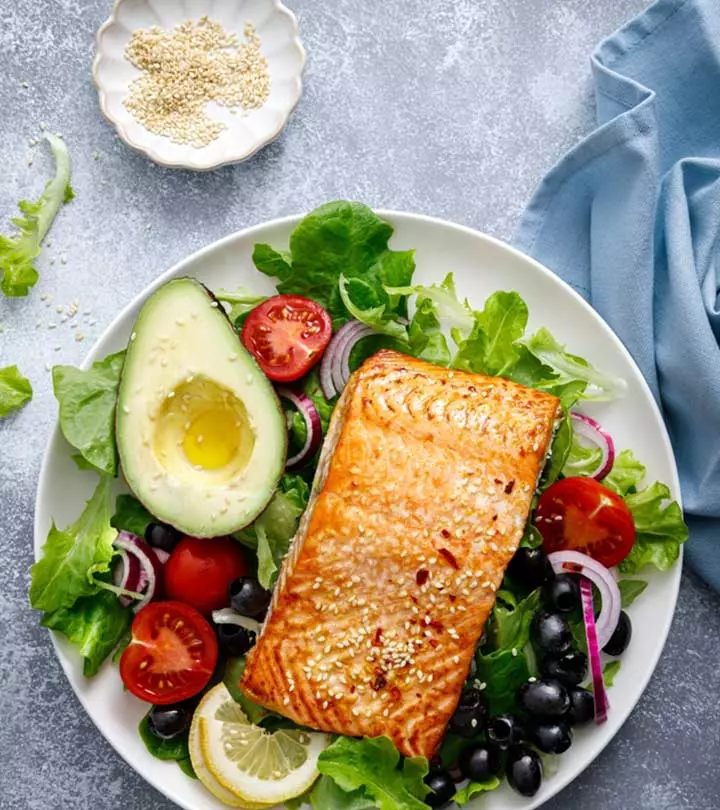
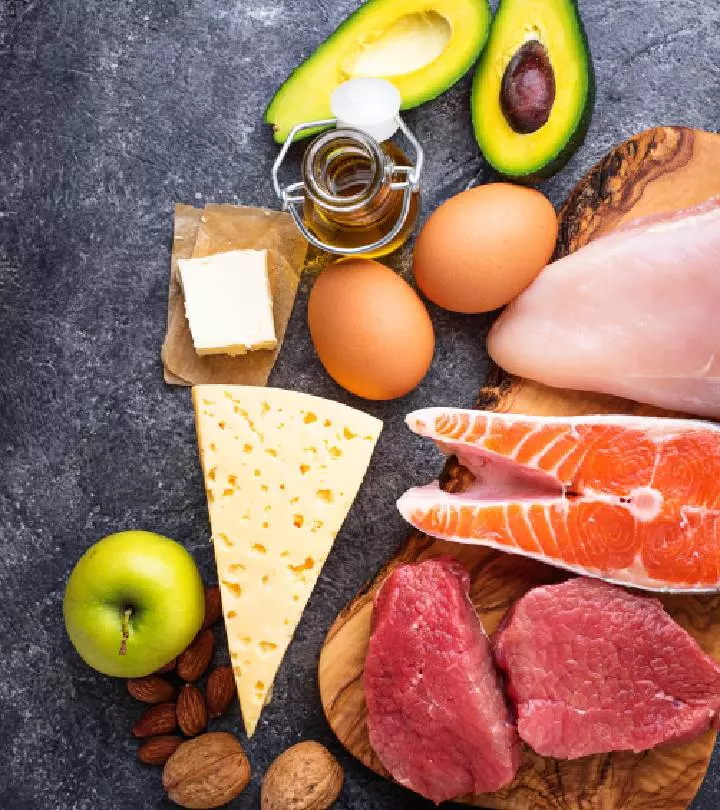

Community Experiences
Join the conversation and become a part of our empowering community! Share your stories, experiences, and insights to connect with other beauty, lifestyle, and health enthusiasts.